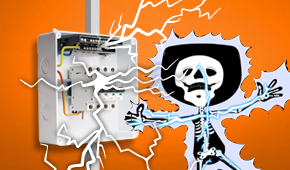Electrical accidents are a potential risk at workplaces, more so, for professionals such as engineers, electricians, power line workers and technicians who work with electrical equipment every day.
Every year, on a global scale, thousands of accidents occur at the workplace owing to contact with electricity.
Voltages over 50 volts AC or 120 volts DC can be highly dangerous. Shocks from faulty equipment or contact with underground or overhead cables are likely to cause permanent injury to employees at the workplace. Faulty electrical equipment is also one of the causes for fire accidents at the work place.
To establish a safe working environment, organizations should spread awareness among employees relating to the damages caused by electrical hazards such as shocks, burns, fires and the dangers of static electricity. At the same time, employees should be trained on how to manage accidents and implement emergency planning to escape electrical incidents safely.
Evaluation of protective measures related to electricity such as insulation, electricity conductors, circuit protection devices and grounding will help you and your organization to act appropriately in the event of an accident. Further, this course will discuss the fundamental concepts of electricity, electrical hazards, combating electrical fires and safety and preventative measures to prevent accidents caused by electricity
Electrical accidents are a potential risk at workplaces, more so, for professionals such as engineers, electricians, power line workers and technicians who work with electrical equipment every day.
Every year, on a global scale, thousands of accidents occur at the workplace owing to contact with electricity.
Voltages over 50 volts AC or 120 volts DC can be highly dangerous. Shocks from faulty equipment or contact with underground or overhead cables are likely to cause permanent injury to employees at the workplace. Faulty electrical equipment is also one of the causes for fire accidents at the work place.
To establish a safe working environment, organizations should spread awareness among employees relating to the damages caused by electrical hazards such as shocks, burns, fires and the dangers of static electricity. At the same time, employees should be trained on how to manage accidents and implement emergency planning to escape electrical incidents safely.
Evaluation of protective measures related to electricity such as insulation, electricity conductors, circuit protection devices and grounding will help you and your organization to act appropriately in the event of an accident. Further, this course will discuss the fundamental concepts of electricity, electrical hazards, combating electrical fires and safety and preventative measures to prevent accidents caused by electricity
Our Program Covers
Course Reviews
No Reviews found for this course.



